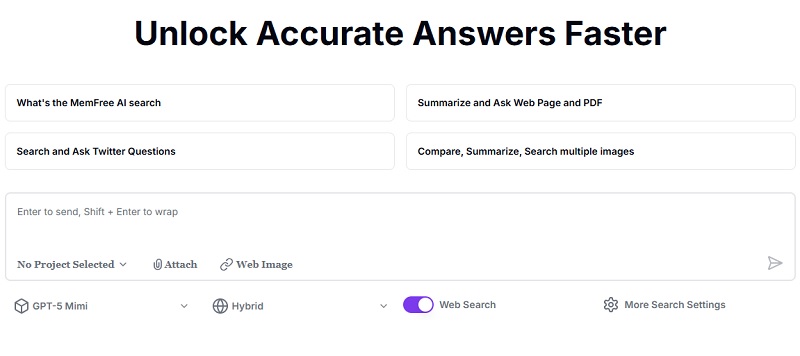MemFree is an open-source, hybrid AI search engine and AI page generator launched in 2024. Its core value proposition lies in its ability to simultaneously search personal knowledge bases (bookmarks, notes, documents) and the entire internet, delivering “Accurate Answers from your knowledge base and the whole internet” in the shortest possible time. Beyond search, MemFree also functions as an “AI Page Generator,” leveraging advanced AI models like Claude 3.5 Sonnet and modern front-end frameworks (React + Tailwind + Shadcn UI) to create “production-ready UI pages for you in seconds.”
The platform aims to enhance productivity, streamline information retrieval, and reduce costs associated with multiple AI subscriptions by integrating diverse AI capabilities and supporting various search engines and input formats. Early user feedback emphasizes its accuracy, speed, and effectiveness, particularly for code-related queries.
I. Key Themes and Important Ideas
A. Hybrid AI Search Engine
MemFree is fundamentally a “Hybrid AI Search Engine” that bridges the gap between personal knowledge and public web information.
Unified Search Capability:
- It “simultaneously search your personal knowledge base (such as bookmarks, notes, documents, etc.) and the internet.”
- This eliminates “the need for manual organization of notes, bookmarks, and documents.”
- Supported local file formats include “text, PDF, Docx, PPTX, and Markdown files.”
- It also offers “Chrome Bookmark Sync: One-click synchronization and indexing.”
Instant and Accurate Answers:
- Users can “instantly get Accurate Answers from your knowledge base and the whole internet.”
- The goal is to “obtain the best answers in the shortest time.”
- It uses “AI to instantly summarize the best content from web pages and your knowledge base, saving valuable time.”
Advanced AI Integration:
- MemFree “Integrates ChatGPT, Claude, and Gemini for diverse AI capabilities.” It specifically mentions using “GPT-4o mini” for comprehensive results.
- It supports “Multiple Search Engines Supported: Works with Google, Exa, and Vector.”
- Features “Automatic Web Search Decisions: Automatically determines when to perform internet searches.”
Diverse Input and Output Formats:
- Supports “Multiple Search Input Format: Text, images, files, and web pages, in particular, it supports multi-image search, comparison, summarization, and analysis.”
- Offers “Multiple Results Presentation Methods: Text, mind maps, images, and videos.”
B. AI Page Generation (PageGen)
MemFree extends beyond search with its “AI Page Generator” functionality.
Rapid UI Creation:
- It enables “100x Faster UI Page Creation” by converting “text or images into stunning, production-ready code in seconds.”
- Leverages “the most powerful AI model – Claude 3.5 Sonnet and the most popular front-end framework – React + Tailwind + Shadcn UI.”
Developer-Centric Features:
- Includes “Real-Time UI Preview” and “Visualiz[ation of] your designs as you create.”
- Offers “Image-Driven UI Generation” and “File-to-Page Generation” with AI parsing and summary.
- Features “Code Editor Integration” with VSCode-like capabilities and “Smart Error Correction.”
- Supports “Animation Support” and “Responsive Code and Preview” across devices.
- Provides “One-Click UI Publishing” and “Dark Mode Code and Preview.”
C. Value Proposition and Benefits
Enhanced Productivity and Knowledge Management:
- “Efficient Knowledge Management: MemFree eliminates the need for manual organization of notes, bookmarks, and documents.”
- “Freeing up your memory and boosting productivity.”
- “The AI organizes your personal knowledge base, allowing you to bypass the hassle of memorization or management.”
Cost-Effectiveness:
- “Avoid multiple subscriptions to services like ChatGPT Plus, Claude Pro, and Gemini Advanced. MemFree integrates their functionalities, significantly reducing monthly costs.”
Open-Source and Self-Hostable:
- MemFree is “open-source” and offers “One-Click Deployment” options (Zeabur, Vercel, Netlify, Railway, Fly.io, Cloudflare Pages) and “Self-Hosted Installations” (requiring Bun, Upstash Redis, OpenAI API Key, Serper API Key).
- The project encourages “Contributing” via issues and pull requests.
II. Important Facts and Statistics
- Launch Year: 2024
- Open Source: Yes (MIT License)
- GitHub Metrics:Stars: 1.4k
- Forks: 204
- Contributors: 35
- Languages: TypeScript (69.1%), MDX (19.3%), JavaScript (10.9%), Other (0.7%)
- AI Models Integrated: ChatGPT, Claude (specifically Claude 3.5 Sonnet), Gemini, GPT-4o mini.
- Supported Search Engines: Google, Exa, Vector.
- Front-end Stack for PageGen: React + Tailwind + Shadcn UI.
- One user, Kensen, stated: “In the past three months, I have used MemFree every day. I would ask MemFree about all the problems I encountered first, and most of them would get satisfactory answers. 90% of the code of MemFree itself was written using MemFree.”
- Available Platforms: Web-Based.
- Integrations: Chrome Extension, HARPA AI (as listed in comparison chart).
- Multi-Language Support: English, Chinese, German, French, Spanish, Japanese, and Arabic.
- Company Headquarters: United States.
III. Comparisons and Alternatives
MemFree operates in a competitive landscape of AI-powered search and development tools.
- Direct Competitors (AI Search Engines): Perplexity AI, Felo Search, You.com, ThinkAny, Gist.ai, Brave Search. These are often highlighted for their AI capabilities in summarization, contextual answers, or personalized search.
- General AI Chatbots/LLMs:ChatGPT, Claude, Gemini, DeepSeek – MemFree differentiates by integrating these rather than being a standalone chatbot, and by combining them with personal data.
- Knowledge Management/Enterprise Search: Guru – focuses on enterprise knowledge platforms and integrations with numerous SaaS apps, contrasting with MemFree’s personal knowledge base integration and open-source nature.
- AI Coding Assistants/IDEs: Windsurf Editor – focuses purely on code generation and development acceleration, while MemFree’s PageGen is a UI generator.
- Privacy-Focused Search Engines: Searx – a metasearch engine emphasizing privacy and non-tracking, which MemFree does not explicitly highlight as a primary feature, though being self-hostable implies control.
MemFree’s “hybrid” nature, combining personal knowledge indexing with internet search and a robust AI page generator, positions it uniquely among these alternatives. Its open-source model also differentiates it from many proprietary solutions.


 Facebook
Facebook
 LinkedIn
LinkedIn
 X
X
 Reddit
Reddit